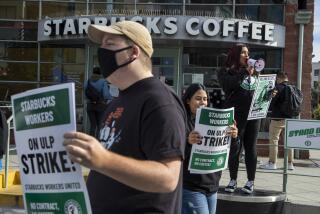Justices Urged to Uphold Key Rights Decision
WASHINGTON — The Supreme Court was urged today to uphold a key 1976 civil rights decision and not retreat in the fight to eliminate “the badges of slavery” in American society.
Julius LeVonne Chambers of the NAACP Legal Defense and Education Fund said the court’s 12-year-old ruling conforms with a law Congress passed in 1866 to eradicate racial discrimination in the wake of emancipation.
“Congress had egregious conduct to correct” after the Civil War, Chambers said. And, he continued, “Congress meant to reach the type of conduct” at issue in the case argued today.
Chambers, who is black, said: “We’re not working on the farms now. We’re working in credit unions. But the badges of slavery were what Congress was trying to reach.”
The Civil Rights Act of 1866 was intended to ensure recently freed slaves all the rights of citizenship.
Chambers is representing a North Carolina woman who accused her former employer, McLean Credit Union, of racial harassment. The case has attracted as much attention as any in the court’s new term begun last week.
Civil rights advocates say they are concerned that it might signal a willingness by a newly solidified conservative court majority to wipe out gains made by minorities over the last 30 years.
The justices are deciding whether they mistakenly ruled in 1976 that the 1866 law authorizes suits against private citizens accused of discrimination.
The court is expected to announce its decision next year.
Roger S. Kaplan, a New York lawyer representing McLean Credit Union, said that the 1866 law “would not reach private acts of discrimination” and that the court in 1976 interfered with the will of Congress in extending the reach of the old statute.
Kaplan received sharp questioning from the justices when he said the proper course now for the court was to abandon precedent and reverse its 12-year-old ruling.
More to Read
Sign up for Essential California
The most important California stories and recommendations in your inbox every morning.
You may occasionally receive promotional content from the Los Angeles Times.










